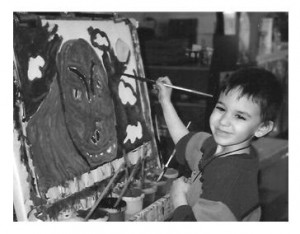This is why I read The New York Times, for lines like this: “Discoveries are the products of the human mind.”
 That bit of wisdom is buried in an opinion piece on serendipity — a statement reminding us that happy accidents don’t simply happen; rather, we are more likely to stumble into them when we’re open to encountering the unexpected, when we’re observant, and when we allow curiosity to take us on a merry, meandering journey of… yes, discovery.
That bit of wisdom is buried in an opinion piece on serendipity — a statement reminding us that happy accidents don’t simply happen; rather, we are more likely to stumble into them when we’re open to encountering the unexpected, when we’re observant, and when we allow curiosity to take us on a merry, meandering journey of… yes, discovery.
Think of children. Consider their curiosity. Relive their delight in wandering and in imagining.
Now think about your own life. Come on. Surely, you can reach back to an amazing adventure that took you entirely by surprise in part because you followed your intuition. You had the willingness not to turn away. Instead, you went with the flow.
And so you made a new friend. You fell in love. You fell in love with Florence and changed countries!
You nabbed a new job. You started a business. You gained a new perspective and switched political parties!
What Is Serendipity?
Reading Pagan Kennedy’s “How to Cultivate the Art of Serendipity,” I was fascinated not only by the origin of the word, serendipity, but by the variety of scientific discoveries she details that resulted from a dash of “happy accident.” And happy accident is, for most of us, what serendipity has come to mean.
Ms. Kennedy writes:
A surprising number of the conveniences of modern life were invented when someone stumbled upon a discovery or capitalized on an accident: the microwave oven, safety glass, smoke detectors, artificial sweeteners, X-ray imaging.
Yet what sticks with me about Ms. Kennedy’s column is this: People create their happy accidents, or, at the very least, actively consider them, develop them, and ride them out. Serendipity is anything but “dumb luck.” In fact, its 18th century origin encompasses the ability to keenly observe whatever we may stumble upon. That is the context in which we find this line:
Discoveries are the products of the human mind.
Personally, I find that concept thrilling!
Lights Down, Popcorn at the Ready, Movie Time
Who recalls the 2001 romantic film, Serendipity?
 It’s a lovely albeit formulaic tale involving a funny young man (John Cusack), a quirky young woman (Kate Beckinsale), their respective friends and fiancés, and of course, their serendipitous encounter. That encounter takes places over a pair of gloves at Bloomie’s, and sparks fly as they go back and forth on whether to pursue their mutual attraction.
It’s a lovely albeit formulaic tale involving a funny young man (John Cusack), a quirky young woman (Kate Beckinsale), their respective friends and fiancés, and of course, their serendipitous encounter. That encounter takes places over a pair of gloves at Bloomie’s, and sparks fly as they go back and forth on whether to pursue their mutual attraction.
Naturally, there are obstacles in their path as this boy-meets-girl, boy-loses-girl, boy-gets-the-girl story continues. So what ultimately brings them together after a cross-country romp and a series of comical near-misses?
The lengths they go to in giving their initial “happy accident” a hand.
In other words, serendipity ought to have a verbal form. It isn’t something that happens to us; it’s something we pursue.
Encounters, Anyone?
Some of us, it seems, are more inclined to “encounter” discoveries. Those discoveries may be concepts, products, processes, people. Do we call this inclination open-mindedness? Do we call it imagination? Do we praise unbridled curiosity? Do we raise the banner of creativity?
I’m leaning toward all of the above, and no doubt, a good deal more.
Not looking to dryly slice and dice it — why not leave it to a measure of multidisciplinary magic? — I would be inclined to say that those who capitalize on the “happy accident” possess a propensity for staying open and for allowing the mind to digress.
And speaking of digression, for the parents among us, don’t we recall how brightly both curiosity and creativity burned for our children when they were young? So why do we allow “life” to squeeze it out of them — and us?
Shouldn’t we continue to say “yes” to adventures? Yes to meeting new people? Yes to undertaking something new, even if it means risking failure?
Values and Dollar Value
I have only to glance at my TV, my smartphone, my tablet, my laptop — and it’s unavoidable. Every medium seems to bombard us with the superficial, the flashy, the quick hit, the “given,” the entitlement to what we are told should be “given.”
Have our cultural values (or lack thereof) demolished our opportunities for quality seeking? For seeking quality? Have they dulled our desire to pay attention? Have they so downgraded the importance of allowing the mind to wander or to probe that we feel guilty if we enjoy our thought processes? Thinking, purely for the experience and pleasure of it? Thinking, that may lead to serendipitous discoveries? To innovation? To insight?
 I may bemoan our current dwindling attention span. I certainly do bemoan the societal pressures we put on pre-pubescent children to begin building their resumes. And I vacillate between despair and outrage when I look at the creative output that is expected to be given away — the work product of writers, artists, photographers, filmmakers, musicians — a fact that crushes the creative flame, not to mention makes it damn difficult to earn a living.
I may bemoan our current dwindling attention span. I certainly do bemoan the societal pressures we put on pre-pubescent children to begin building their resumes. And I vacillate between despair and outrage when I look at the creative output that is expected to be given away — the work product of writers, artists, photographers, filmmakers, musicians — a fact that crushes the creative flame, not to mention makes it damn difficult to earn a living.
And there you have it. Money. The reason we don’t encourage creativity…
A Bright Note
On a bright note, as Ms. Kennedy reminds us at the outset in her article, we continue to see new products — technological, pharmaceutical — that are the result of unintended discoveries. And as she quotes Horace Walpole (1754), who proposed the new word “serendipity” so long ago, fortunately, there are men and women who are…
… always making discoveries, by accident and sagacity, of things which they were not in quest of.
Reminding ourselves to stay open, to appreciate the unexpected moment, to cultivate the “encountering” spirit that comes so naturally when we are children… That sounds like an excellent approach to each day, doesn’t it?
And yes, of course, as adults we have responsibilities, schedules, divided priorities. But can’t we make a little time — or at least a little awareness — to create the space for serendipity to flourish?
You May Also Enjoy
Building resumes for children?! Can hardly think of a better antidote to creativity and serendipity!
Thank you for this.
Sharon
I agree! xo
OF COURSE WE CAN!!!!!!!!!!!XX